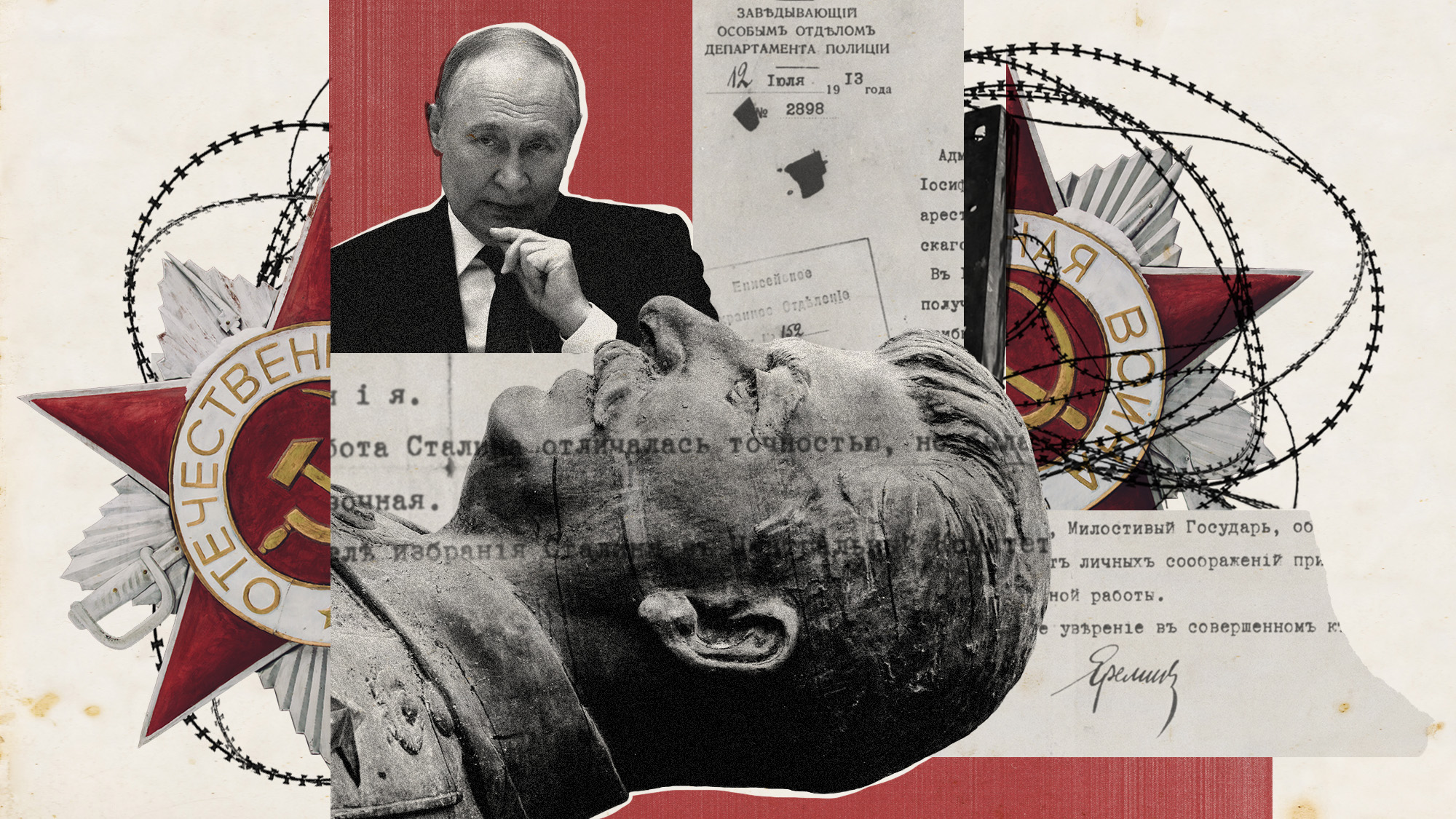Why is Putin 'de-exonerating' Stalin's victims?
Russian president has 'insatiable impulse' to 'rewrite history', say commentators

A free daily email with the biggest news stories of the day – and the best features from TheWeek.com
You are now subscribed
Your newsletter sign-up was successful
Russian authorities have for many decades exonerated people who were wronged during the Soviet era. Vladimir Putin has not only abandoned this programme but put it into reverse.
The president's move has puzzled many outside Russia but it's all part of his drive to rewrite his nation's history – his "insatiable itch to place memory of the Russian past under official control", said Tony Barber in the Financial Times.
'Guilty after all'
Starting in the 1950s and then gathering pace in the 1980s and 90s, more than 3.5 million people who were arrested, tortured and sentenced by the "now-extinct totalitarian regime" were acquitted, often posthumously, said Leon Aron in The Atlantic.
The Week
Escape your echo chamber. Get the facts behind the news, plus analysis from multiple perspectives.

Sign up for The Week's Free Newsletters
From our morning news briefing to a weekly Good News Newsletter, get the best of The Week delivered directly to your inbox.
From our morning news briefing to a weekly Good News Newsletter, get the best of The Week delivered directly to your inbox.
In 2013, Putin seemed to be on board with this philosophy. He spoke of the "dark period" of Stalin, condemning his "personality cult and mass violations of the law", with "repression and camps", but now, said The Atlantic, Putin has decided that Stalin's victims "were guilty after all".
Over the last four years, a Russian military court has been denying rehabilitation to people who suffered political repression during the Soviet era, the BBC discovered. The initiative spiked in 2023, the second year of Putin's invasion of Ukraine, when prosecutors asked a court to approve the denial of rehabilitation or the cancellation of rehabilitation for more than 120 people.
The identities of many of these people have been kept secret but some are known. Metropolitan Joseph (Chernov), a bishop who served in the Russian Orthodox Church for 57 years, spent almost 20 years in Soviet camps and was rehabilitated in 1992, posthumously. In 2020, there were moves to canonise him but prosecutor's office decided to move in the opposite direction: it cancelled his rehabilitation.
There's also been a push to reinstate charges and, although it's "ostensibly aimed" at "traitors of the Motherland and Nazi accomplices" during the Second World War, the "enormous scope" of the operation is thought to include other victims of Stalin. The prosecutor general has already reinstated the charges against 4,000 people – effectively de-exonerating them – as part of a two-year "audit".
A free daily email with the biggest news stories of the day – and the best features from TheWeek.com
'War on memory'
To many people outside Russia, the resentencing of deceased political prisoners will "appear ludicrous", said Aron. "Why go to all this trouble?"
For the first 10 years of Putin's reign, "rapid" economic growth gave his regime "popularity" and "legitimacy", but since that "petered out", Putin has tried to "rally the public" to the "defence" of a motherland "besieged" by the "perfidious" and "cunning" West.
He's "long sensed" what his immediate predecessors "tended to disregard" – that many Russians have a "deep-seated trauma" from the loss of their country's "exalted place" in the world. Rather than continue to "reckon", as Gorbachev and Yeltsin did, with the "true causes" of that, he prefers to "erase" the public's memory of the millions arrested, tortured and killed under Stalin.
This move from Putin "combines propaganda with an insatiable impulse to rewrite Russian history", said the FT. The "all-important context", however, is Putin’s "assault on Ukrainian nationhood" and his "crackdown on dissent at home", because Ukrainian and Baltic nationalists, as well as Russian "bandit groups" that resisted Soviet rule, are thought to be among those targeted.
Noting William Faulkner's saying that "the past is never dead, it's not even passed", Peter Caddick–Adams said on The Critic that the past is "alive and well in Putintown, where the president has weaponised his country’s history".
The programme "risks reopening painful wounds" in society, said Barber in the FT, and "even tempting" people to draw comparisons between Putin and Stalin. Nevertheless, this "historical revisionism" has become an "indispensable feature" of his rule, said Aron, and for as long as he's in power, his "war on memory" will only "broaden and deepen".
Chas Newkey-Burden has been part of The Week Digital team for more than a decade and a journalist for 25 years, starting out on the irreverent football weekly 90 Minutes, before moving to lifestyle magazines Loaded and Attitude. He was a columnist for The Big Issue and landed a world exclusive with David Beckham that became the weekly magazine’s bestselling issue. He now writes regularly for The Guardian, The Telegraph, The Independent, Metro, FourFourTwo and the i new site. He is also the author of a number of non-fiction books.